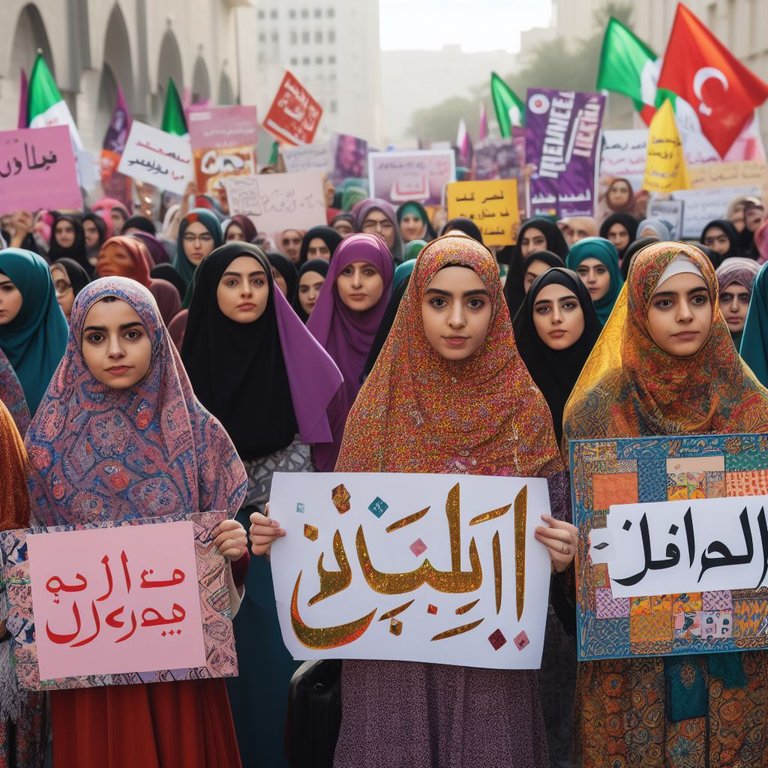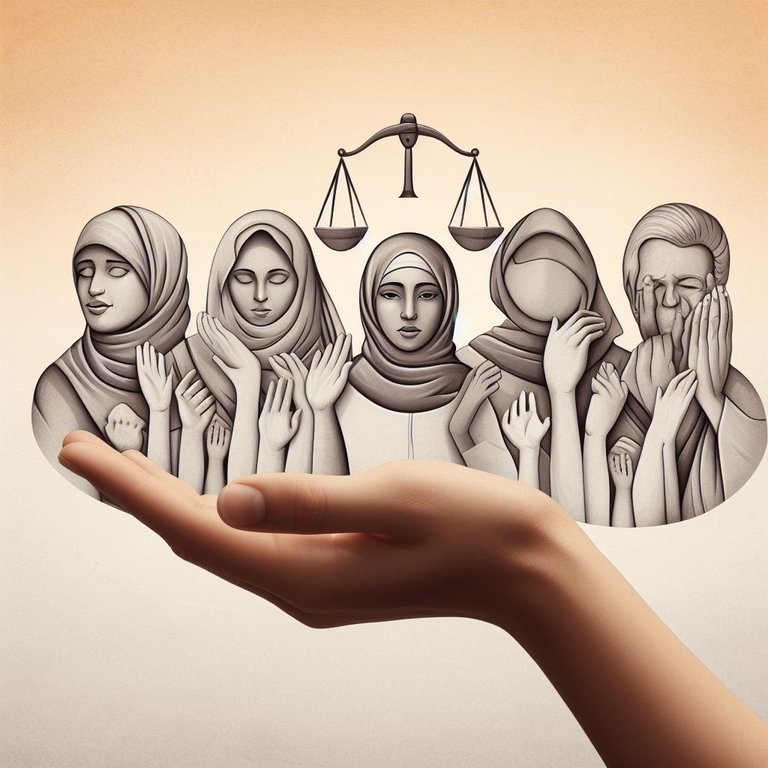Can one be a feminist and a practitioner of the Muslim religion? // ¿Se puede ser feminista y practicante de la religión musulmana? (EN/ES)

Feminism is a social and political movement that advocates equal rights and opportunities for men and women, as well as the recognition of diversity and women's autonomy. Islam is a monotheistic religion based on the belief in one God, Allah, and the revelation of his message through the prophet Muhammad and the holy book of the Koran.
Is it possible to reconcile these two realities, and is it possible to be a feminist and a practitioner of the Muslim religion? This is a question that many women who profess Islam and who identify with the values and demands of feminism ask themselves. The answer is not simple, as it involves questioning the patriarchal interpretations and traditions that have dominated Islamic history and culture, as well as engaging in dialogue with Western feminism, which has often ignored or stereotyped the reality of Muslim women.
To answer this question, it is necessary to distinguish between Islam as a religion and Islam as a culture. Islam as a religion refers to the set of beliefs, rules and practices derived from the Qur'an and Sunna (the tradition of the Prophet Muhammad). Islam as a culture refers to the set of customs, values and ways of life that have developed in different Muslim societies throughout history and that do not always correspond to Islam as a religion.

Islam as a religion, according to some scholars and activists, is not incompatible with feminism, but contains elements that favor equality and justice among human beings, regardless of their sex or gender. For example, the Qur'an recognizes the dignity and rights of women, exhorts them to participate in social and political life, grants them the right to education, work, inheritance, divorce and choice of spouse, among others. In addition, the Qur'an states that men and women are equal before God and that they will be judged by their deeds, not by their gender.
However, Islam as a culture has been influenced by patriarchy, that is, by the system of male domination over women, which has manifested itself in the interpretation and application of Islamic sources. Thus, norms and practices have been imposed that discriminate and oppress women, such as compulsory veiling, sexual segregation, polygamy, forced marriage, female genital mutilation, gender violence, criminalization of homosexuality, among others. These norms and practices are not part of Islam as a religion, but are the result of the culture and history of each society.
Therefore, to be a feminist and practitioner of the Muslim religion, it is necessary to make a critical and contextualized reading of Islamic sources, from a gender and human rights perspective. This implies resorting to ijtihad, that is, to the effort of personal and collective interpretation of the Qur'an and Sunna, taking into account the historical, social and cultural context in which they were revealed and transmitted. Thus, one can recover the original message of Islam, which is compatible with feminism, and reject patriarchal interpretations, which are contrary to Islam and feminism.

This is the goal of Islamic feminism, a movement that reclaims the role of women in Islam and advocates complete equality of all Muslims, both in public and private life, and social justice, in an Islamic context. Islamic feminism is based on the Qur'an and the Sunna, but also in dialogue with Western feminism and with other feminist currents, such as black feminism, decolonial feminism or queer feminism. Islamic feminism presents itself as an alternative to Islamic fundamentalism, which considers feminism as a Western invention and imposes a rigid and oppressive vision of Islam, and to Western feminism, which sometimes considers Islam as a misogynist religion and imposes an ethnocentric and homogenizing vision of feminism.
Islamic feminism is present in different countries, from the Maghreb, the Mashreq and Asia, to Europe and the United States, mobilizing against patriarchy based on Muslim references. Some of its most prominent representatives are Amina Wadud, Asma Barlas, Fatima Mernissi, Ziba Mir-Hosseini, Riffat Hassan, Leila Ahmed, Asma Lamrabet, Shirin Ebadi, Malala Yousafzai, among others. These women have contributed to the construction of an Islamic feminist discourse and practice, which questions the place of women in Muslim countries and in Islam, and which gives a central role to education as an element of women's autonomy.
In conclusion, one can be a feminist and a practitioner of the Muslim religion, as long as a distinction is made between Islam as a religion and Islam as a culture, and a critical and contextualized interpretation of Islamic sources is made, from a gender and human rights perspective. Islamic feminism is an expression of this possibility, which seeks the emancipation of Muslim women and dialogue with other feminist currents, from an Islamic identity and cultural diversity.

El feminismo es un movimiento social y político que defiende la igualdad de derechos y oportunidades entre hombres y mujeres, así como el reconocimiento de la diversidad y la autonomía de las mujeres. El islam es una religión monoteísta que se basa en la creencia en un solo Dios, Alá, y en la revelación de su mensaje a través del profeta Mahoma y el libro sagrado del Corán.
¿Es posible conciliar estas dos realidades? ¿Se puede ser feminista y practicante de la religión musulmana? Esta es una pregunta que se plantean muchas mujeres que profesan el islam y que se sienten identificadas con los valores y las reivindicaciones del feminismo. La respuesta no es sencilla, ya que implica cuestionar las interpretaciones y las tradiciones patriarcales que han dominado la historia y la cultura islámica, así como dialogar con el feminismo occidental, que a menudo ha ignorado o estereotipado la realidad de las mujeres musulmanas.
Para responder a esta pregunta, es necesario distinguir entre el islam como religión y el islam como cultura. El islam como religión se refiere al conjunto de creencias, normas y prácticas que se derivan del Corán y de la Sunna (la tradición del profeta Mahoma). El islam como cultura se refiere al conjunto de costumbres, valores y formas de vida que se han desarrollado en las diferentes sociedades musulmanas a lo largo de la historia y que no siempre se corresponden con el islam como religión.

El islam como religión, según algunas estudiosas y activistas, no es incompatible con el feminismo, sino que contiene elementos que favorecen la igualdad y la justicia entre los seres humanos, independientemente de su sexo o género. Por ejemplo, el Corán reconoce la dignidad y los derechos de las mujeres, las exhorta a participar en la vida social y política, les otorga el derecho a la educación, al trabajo, a la herencia, al divorcio y a la elección de su esposo, entre otros. Además, el Corán establece que los hombres y las mujeres son iguales ante Dios y que serán juzgados por sus obras, no por su género.
Sin embargo, el islam como cultura ha sido influenciado por el patriarcado, es decir, por el sistema de dominación de los hombres sobre las mujeres, que se ha manifestado en la interpretación y la aplicación de las fuentes islámicas. Así, se han impuesto normas y prácticas que discriminan y oprimen a las mujeres, como el velo obligatorio, la segregación sexual, la poligamia, el matrimonio forzado, la mutilación genital femenina, la violencia de género, la penalización de la homosexualidad, entre otras. Estas normas y prácticas no son parte del islam como religión, sino que son fruto de la cultura y la historia de cada sociedad.
Por lo tanto, para ser feminista y practicante de la religión musulmana, es necesario hacer una lectura crítica y contextualizada de las fuentes islámicas, desde una perspectiva de género y de derechos humanos. Esto implica recurrir al iytihad, es decir, al esfuerzo de interpretación personal y colectiva del Corán y de la Sunna, teniendo en cuenta el contexto histórico, social y cultural en el que fueron revelados y transmitidos. Así, se puede recuperar el mensaje original del islam, que es compatible con el feminismo, y rechazar las interpretaciones patriarcales, que son contrarias al islam y al feminismo.

Este es el objetivo del feminismo islámico, un movimiento que reivindica el papel de las mujeres en el islam y que aboga por la igualdad completa de todos los musulmanes, tanto en la vida pública como en la privada, y por la justicia social, en un contexto islámico. El feminismo islámico se basa en el Corán y en la Sunna, pero también en el diálogo con el feminismo occidental y con otras corrientes feministas, como el feminismo negro, el feminismo decolonial o el feminismo queer. El feminismo islámico se presenta como una alternativa al fundamentalismo islámico, que considera al feminismo como una invención occidental y que impone una visión rígida y opresiva del islam, y al feminismo occidental, que a veces considera al islam como una religión misógina y que impone una visión etnocéntrica y homogeneizadora del feminismo.
El feminismo islámico está presente en diferentes países, desde el Magreb, el Mashreq y Asia, hasta Europa y Estados Unidos, movilizándose contra el patriarcado a partir de referencias musulmanas. Algunas de sus representantes más destacadas son Amina Wadud, Asma Barlas, Fatima Mernissi, Ziba Mir-Hosseini, Riffat Hassan, Leila Ahmed, Asma Lamrabet, Shirin Ebadi, Malala Yousafzai, entre otras. Estas mujeres han contribuido a la construcción de un discurso y una práctica feminista islámica, que cuestiona el lugar de las mujeres en los países musulmanes y en el islam, y que otorga un papel central a la educación como elemento de autonomía de las mujeres.
En conclusión, se puede ser feminista y practicante de la religión musulmana, siempre y cuando se haga una distinción entre el islam como religión y el islam como cultura, y se haga una interpretación crítica y contextualizada de las fuentes islámicas, desde una perspectiva de género y de derechos humanos. El feminismo islámico es una expresión de esta posibilidad, que busca la emancipación de las mujeres musulmanas y el diálogo con otras corrientes feministas, desde una identidad islámica y una diversidad cultural.

Para la realización de este post consulté las siguientes fuentes// For the realization of this post I consulted the following sources:
Las fotos que utilicé fueron generadas por mi con inteligencia artificial en bing.com
The photos I used were generated by me with artificial intelligence on bing.com.
Congratulations @danielucha! You have completed the following achievement on the Hive blockchain And have been rewarded with New badge(s)
Your next target is to reach 20 posts.
You can view your badges on your board and compare yourself to others in the Ranking
If you no longer want to receive notifications, reply to this comment with the word
STOPTo support your work, I also upvoted your post!
Check out our last posts:
Excelente publicación 👌🏻. Yo creo que todos necesitamos leer esto porque a pesar de que podamos hacernos una idea, para nada es tan acabada como lo muestras aunque sea simplemente un acercamiento al tema.
Gracias 😁, yo misma tenía muchos prejuicios sobre Corán y todo lo relacionado con la religión antes de ponerme a investigar sobre ello, leer sobre el tema ha sido muy esclarecedor e interesante.